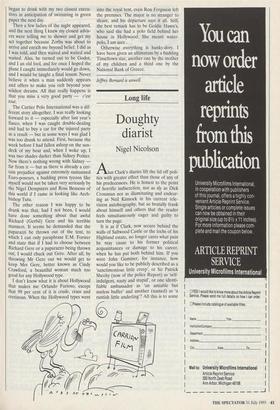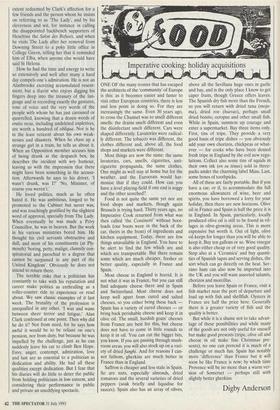Long life
Doughty diarist
Nigel Nicolson
Aan Clark's diaries lift the lid off poli- tics with greater effect than those of any of his predecessors. He is honest to the point of horrific indiscretion, not as sly as Dick Crossman nor as illuminating and endear- ing as Neil Kinnock in his current tele- vision autobiography, but so brutally frank about himself and others that the reader feels simultaneously eager and guilty to turn the page.
It is as if Clark, now secure behind the walls of Saltwood Castle or the lochs of his Highland estate, no longer cares what pain he may cause to his former political acquaintances or damage to his career, when he has put both behind him. If you were John Gummer, for instance, how would you like to be publicly described as a `sanctimonious little creep', or Sir Patrick Sheehy (now of the police Report) as 'self- indulgent, nasty and stupid', or one identi- fiable ambassador as 'an amiable but useless buffer' and another (named) as 'a runtish little underling'? All this is to some
extent redeemed by Clark's affection for a few friends and the person whom he insists on referring to as 'The Lady', and by his cleverness and wit, for instance in calling the disappointed backbench supporters of Heseltine the Salon des Refuses, and when he visits The Lady after her removal from Downing Street to a poky little office in College Green, telling her that it reminded him of Elba, when anyone else would have said St Helena.
How he had the time and energy to write so extensively and well after many a hard day compels one's admiration. He is not an Alanbrooke excreting accumulated resent- ment, but a diarist who enjoys digging his fingers deep into the treasury of the lan- guage and in recording exactly the gestures, tone of voice and the very words of the people with whom he has just caroused or quarrelled, knowing that a dozen words of oratio recta, including undeleted expletives, are worth a hundred of obliqua. Nor is he in the least reticent about his own weak- nesses and disasters. When he chats up a strange girl in a train, he tells us about it. When an Opposition member accuses him of being drunk at the despatch box, he describes the incident with wry humour, leaving us with the impression that there might have been something in the accusa- tion. Afterwards he says to his driver, 'I wasn't drunk, was I?"No, Minister, of course you weren't.'
He loved politics, much as he often hated it. He was ambitious, longed to be promoted to the Cabinet but never was, and was touchingly gratified by the slightest word of approval, specially from The Lady. When eventually he was made a Privy Councillor, he was in heaven. But the work in his various ministries bored him. He thought his civil servants obstructive and dull, and most of his constituents (at Ply- mouth) 'boring, petty, malign, clumsily con- spiratorial and parochial to a degree that cannot be surpassed in any part of the United Kingdom'. Obviously he does not intend to return there.
The terrible risks that a politician has constantly to take with his reputation and career make politics as enthralling as a roller-coaster ride to experience or read about. We saw classic examples of it last week. The brutality of the profession is unequalled in any other. 'I wax and wane between sheer terror and fatigue,' Alan Clark confessed at one point. Then why did he do it? Not from need, for he says how awful it would be to be reliant on one's pension, nor from duty, but because he was impelled by the challenge, just as he can suddenly leave his car to climb Ben Hope. Envy, anger, contempt, admiration, love and lust are as essential to a politician as dedication and ability. He had all these qualities except dedication. But I fear that his diaries will do little to deter the public from holding politicians in low esteem, and considering their performance in public and private an unedifying spectacle.



















































 Previous page
Previous page